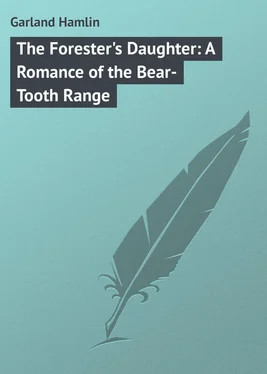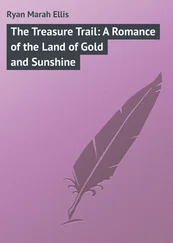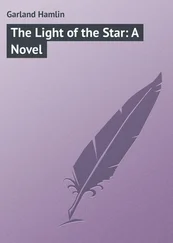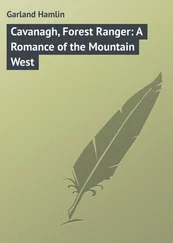Hamlin Garland - The Forester's Daughter - A Romance of the Bear-Tooth Range
Здесь есть возможность читать онлайн «Hamlin Garland - The Forester's Daughter - A Romance of the Bear-Tooth Range» — ознакомительный отрывок электронной книги совершенно бесплатно, а после прочтения отрывка купить полную версию. В некоторых случаях можно слушать аудио, скачать через торрент в формате fb2 и присутствует краткое содержание. Издательство: Иностранный паблик, Жанр: foreign_language, foreign_prose, foreign_adventure, на английском языке. Описание произведения, (предисловие) а так же отзывы посетителей доступны на портале библиотеки ЛибКат.
- Название:The Forester's Daughter: A Romance of the Bear-Tooth Range
- Автор:
- Издательство:Иностранный паблик
- Жанр:
- Год:неизвестен
- ISBN:нет данных
- Рейтинг книги:4 / 5. Голосов: 1
-
Избранное:Добавить в избранное
- Отзывы:
-
Ваша оценка:
- 80
- 1
- 2
- 3
- 4
- 5
The Forester's Daughter: A Romance of the Bear-Tooth Range: краткое содержание, описание и аннотация
Предлагаем к чтению аннотацию, описание, краткое содержание или предисловие (зависит от того, что написал сам автор книги «The Forester's Daughter: A Romance of the Bear-Tooth Range»). Если вы не нашли необходимую информацию о книге — напишите в комментариях, мы постараемся отыскать её.
The Forester's Daughter: A Romance of the Bear-Tooth Range — читать онлайн ознакомительный отрывок
Ниже представлен текст книги, разбитый по страницам. Система сохранения места последней прочитанной страницы, позволяет с удобством читать онлайн бесплатно книгу «The Forester's Daughter: A Romance of the Bear-Tooth Range», без необходимости каждый раз заново искать на чём Вы остановились. Поставьте закладку, и сможете в любой момент перейти на страницу, на которой закончили чтение.
Интервал:
Закладка:
Garland Hamlin
The Forester's Daughter: A Romance of the Bear-Tooth Range
I
THE HAPPY GIRL
The stage line which ran from Williams to Bear Tooth (one of the most authentic then to be found in all the West) possessed at least one genuine Concord coach, so faded, so saddened, so cracked, and so splintered that its passengers entered it under protest, and alighted from it with thanksgiving, and yet it must have been built by honorable men, for in 190- it still made the run of one hundred and twenty miles twice each week without loss of wheel or even so much as moulting a scrap of paint.
And yet, whatever it may have been in its youth, it was in its age no longer a gay dash of color in the landscape. On the contrary, it fitted into the dust-brown and sage-green plain as defensively as a beetle in a dusty path. Nevertheless, it was an indispensable part of a very moving picture as it crept, creaking and groaning (or it may be it was the suffering passenger creaking and groaning), along the hillside.
After leaving the Grande River the road winds up a pretty high divide before plunging down into Ute Park, as they call all that region lying between the Continental Range on the east and the Bear Tooth plateau on the west. It was a big spread of land, and very far from an Eastern man’s conception of a park. From Dome Peak it seems a plain; but, in fact, when clouds shut off the high summits to the west, this “valley” becomes a veritable mountain land, a tumbled, lonely country, over which an occasional horseman crawls, a minute but persistent insect. It is, to be exact, a succession of ridges and ravines, sculptured (in some far-off, post-glacial time) by floods of water, covered now, rather sparsely, with pinons, cedars, and aspens, a dry, forbidding, but majestic landscape.
In late August the hills become iridescent, opaline with the translucent yellow of the aspen, the coral and crimson of the fire-weed, the blood-red of huckleberry beds, and the royal purple of the asters, while flowing round all, as solvent and neutral setting, lies the gray-green of the ever-present and ever-enduring sage-brush. On the loftier heights these colors are arranged in most intricate and cunning patterns, with nothing hard, nothing flaring in the prospect. All is harmonious and restful. It is, moreover, silent, silent as a dream world, and so flooded with light that the senses ache with the stress of it.
Through this gorgeous land of mist, of stillness, and of death, a few years ago a pale young man (seated beside the driver) rode one summer day in a voiceless rapture which made Bill McCoy weary.
“If you’d had as much of this as I have you’d talk of something else,” he growled, after a half dozen attempts at conversation. Bill wasn’t much to look at, but he was a good driver and the stranger respected him for it.
Eventually this simple-minded horseman became curious about the slim young fellow sitting beside him.
“What you doing out here, anyhow – fishing or just rebuilding a lung?”
“Rebuilding two lungs,” answered the tourist.
“Well, this climate will just about put lungs into a coffee-can,” retorted Bill, with official loyalty to his country.
To his discerning eye “the tourist” now became “a lunger.” “Where do you live when you’re to home?”
“Connecticut.”
“I knew it.”
“How did you know it?” The youth seemed really interested to know.
“I drove another fellow up here last fall that dealt out the same kind of brogue you do.”
This amused the tourist. “You think I have a ‘brogue,’ do you?”
“I don’t think it – I know it!” Bill replied, shortly.
He was prevented at the moment from pursuing this line of inquiry by the discovery of a couple of horsemen racing from a distant ranch toward the road. It was plain, even to the stranger, that they intended to intercept the stage, and Bill plied the lash with sudden vigor.
“I’ll give ’em a chase,” said he, grimly.
The other appeared a little alarmed, “What are they – bandits?”
“Bandits!” sneered Bill. “Your eyesight is piercing. Them’s girls .”
The traveler apologized. “My eyes aren’t very good,” he said, hurriedly.
He was, however, quite justified in his mistake, for both riders wore wide-rimmed sombreros and rode astride at a furious pace, bandanas fluttering, skirts streaming, and one was calling in shrill command, “Oh, Bill!”
As they neared the gate the driver drew up with a word of surprise. “Why, howdy, girls, howdy!” he said, with an assumption of innocence. “Were you wishin’ fer to speak to me?”
“Oh, shut up!” commanded one of the girls, a round-faced, freckled romp. “You know perfectly well that Berrie is going home to-day – we told you all about it yesterday.”
“Sure thing!” exclaimed Bill. “I’d forgot all about it.”
“Like nothin’!” exclaimed the maid. “You’ve been countin’ the hours till you got here – I know you.”
Meanwhile her companion had slipped from her horse. “Well, good-by, Molly, wish I could stay longer.”
“Good-by. Run down again.”
“I will. You come up.”
The young passenger sprang to the ground and politely said: “May I help you in?”
Bill stared, the girl smiled, and her companion called: “Be careful, Berrie, don’t hurt yourself, the wagon might pitch.”
The youth, perceiving that he had made another mistake, stammered an apology.
The girl perceived his embarrassment and sweetly accepted his hand. “I am much obliged, all the same.”
Bill shook with malicious laughter. “Out in this country girls are warranted to jump clean over a measly little hack like this,” he explained.
The girl took a seat in the back corner of the dusty vehicle, and Bill opened conversation with her by asking what kind of a time she had been having “in the East.”
“Fine,” said she.
“Did ye get as far back as my old town?”
“What town is that, Bill?”
“Oh, come off! You know I’m from Omaha.”
“No, I only got as far as South Bend.”
The picture which the girl had made as she dashed up to the pasture gate (her hat-rim blown away from her brown face and sparkling eyes), united with the kindliness in her voice as she accepted his gallant aid, entered a deep impression on the tourist’s mind; but he did not turn his head to look at her – perhaps he feared Bill’s elbow quite as much as his guffaw – but he listened closely, and by listening learned that she had been “East” for several weeks, and also that she was known, and favorably known, all along the line, for whenever they met a team or passed a ranch some one called out, “Hello, Berrie!” in cordial salute, and the men, old and young, were especially pleased to see her.
Meanwhile the stage rose and fell over the gigantic swells like a tiny boat on a monster sea, while the sun blazed ever more fervently from the splendid sky, and the hills glowed with ever-increasing tumult of color. Through this land of color, of repose, of romance, the young traveler rode, drinking deep of the germless air, feeling that the girl behind him was a wondrous part of this wild and unaccountable country.
He had no chance to study her face again till the coach rolled down the hill to “Yancy’s,” where they were to take dinner and change horses.
Yancy’s ranch-house stood on the bank of a fine stream which purled – in keen defiance of the hot sun – over a gravel bed, so near to the mountain snows that their coolness still lingered in the ripples. The house, a long, low, log hut, was fenced with antlers of the elk, adorned with morning-glory vines, and shaded by lofty cottonwood-trees, and its green grass-plat – after the sun-smit hills of the long morning’s ride – was very grateful to the Eastern man’s eyes.
Читать дальшеИнтервал:
Закладка:
Похожие книги на «The Forester's Daughter: A Romance of the Bear-Tooth Range»
Представляем Вашему вниманию похожие книги на «The Forester's Daughter: A Romance of the Bear-Tooth Range» списком для выбора. Мы отобрали схожую по названию и смыслу литературу в надежде предоставить читателям больше вариантов отыскать новые, интересные, ещё непрочитанные произведения.
Обсуждение, отзывы о книге «The Forester's Daughter: A Romance of the Bear-Tooth Range» и просто собственные мнения читателей. Оставьте ваши комментарии, напишите, что Вы думаете о произведении, его смысле или главных героях. Укажите что конкретно понравилось, а что нет, и почему Вы так считаете.












